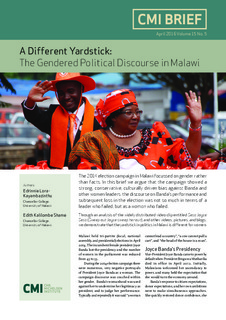| dc.description.abstract | The 2014 election campaign in Malawi focussed on gender rather than facts. In this brief we argue that the campaign showed a strong, conservative, culturally driven bias against Banda and other women leaders. the discourse on Banda’s performance and subsequent loss in the election was not so much in terms of a leader who failed, but as a woman who failed.
Through an analysis of the widely distributed video clip entitled Sesa Joyce Sesa ( Sweep out Joyce sweep her out ), and other videos, pictures, and blogs, we demonstrate that the yardstick in politics in Malawi is different for women.
Malawi held tri-partite (local, national assembly, and presidential) elections in April 2014. The incumbent female president Joyce Banda lost the presidency and the number of women in the parliament was reduced from 43 to 33.
During the 2014 election campaign there were numerous, very negative portrayals of President Joyce Banda as a woman. The campaign discourse was couched within her gender. Banda’s womanhood was used against her to undermine her legitimacy as president, and to judge her performance. Typically and repeatedly it was said “a woman cannot lead a country”, “a cow cannot pull a cart”, and “the head of the house is a man”.
Joyce Banda’s Presidency
Vice-President Joyce Banda came to power by default when President Bingu wa Mutharika died in office in April 2012. Initially, Malawians welcomed her ascendancy to power, and many held the expectation that she would turn the economy around.
Banda’s response to citizen expectations, donor expectations, and her own ambitions were to make simultaneous approaches. She quickly restored donor confidence, she devaluated the local currency and reduced the import bottlenecks, and she improved the relations with neighbouring countries. She went on to reverse a number of her predecessors’ less popular decisions, and she improved the human rights situa | |
